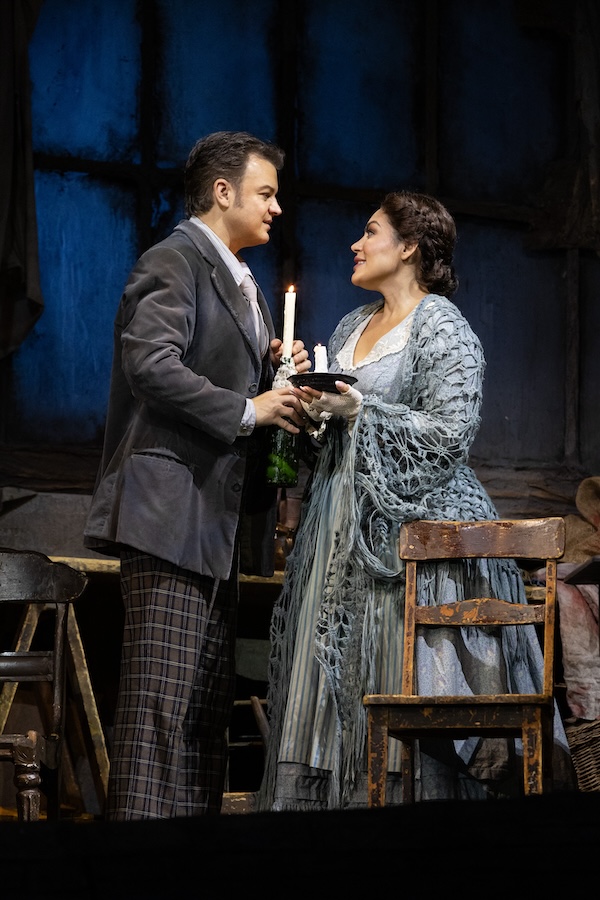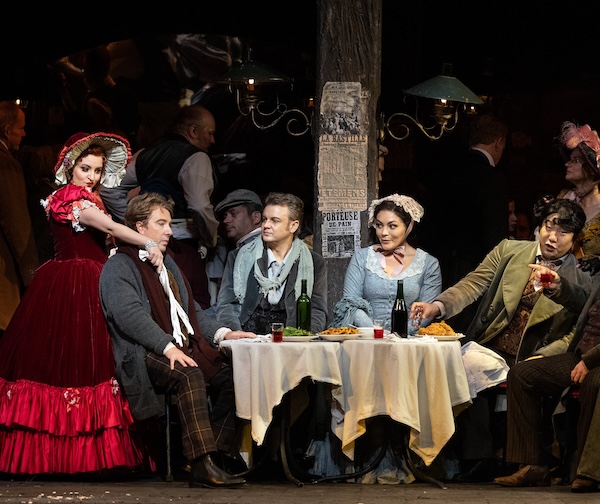A first-rate cast brings the romance and heartache to Met’s “Bohème”

With over 500 performances, even a crowd-pleasing production like Franco Zeffirelli’s La Bohème can be hard to keep fresh, or even interesting. What’s more, this work has been presented more than any other at the Metropolitan Opera, which has been deeply involved with Puccini throughout the company’s history.
Past the charming sets and the spectacular crowd scenes, keeping it worthwhile boils down to the music-making. And for Wednesday night’s opening of this season’s revival, the music-making was very fine indeed.
For this initial run, the strong cast offers soprano Ailyn Pérez as Mimi, tenor Dmytro Popov as Rodolfo, baritone Boris Pinkhasovich as Marcello, and soprano Emily Pogorelc as Musetta. Kensho Watanabe leads in the pit.
Pérez, unsurprisingly, is a musically ravishing Mimi. She has sung both this role and Musetta at the Met before, but Mimi seems ideal for her voice, less a matter of range than key and color. She had a resonance and carry Wednesday that was impressive in itself and supported her shaping of timbre, width, and dynamics in long lines and sustained notes. This made “Si, mi chiamano Mimi” not just sonically beautiful but expressive and dramatic. Each inflection added another piece to the character.
Character was at the core of the evening. This was not just hearing a star like Pérez singing Mimi, it was seeing the character and being involved with her onstage. This was the measure of the artistry of her singing.
She was equalled by Popov. The tenor was vibrant and also appealingly subtle. “Che gelida manina” had an attractive simplicity, balanced by the passion of the third act duet with Mimi. On the technical side, Popov had an impressively even and open tone throughout his range, wider and fuller at the top than one usually hears in this music.
Pinkhasovich was robust and vivacious as Marcello, his singing full of energy and charm. He pushed both the drama and the comedy in his character, and with were highly effective. Marcello is the link between the extroverted entertainments of the group of impoverished artists, the romantic comedy of Musetta, and the tragedy of Mimi’s doom. Even as Rodolfo and Mimi are the dramatic point of Act III, he was often the most compelling singer.

Pogorlec was a powerful presence. Her tone was rounded and had a punchiness to it that captured the balance of Musetta’s outward bluster and inner commitment to Marcello. As with Pérez, her sheer sound was beautiful, with excellent intonation, and one relished hearing her at full volume. The grand Act II duet, “Quando men’ vo soletta” was exhilarating while never dipping into maudlin indulgence.
In this, Watanade and the orchestra were key. His pacing in Act I was just on the relaxed side—but not slow—and this gave everyone on stage the space to breathe and deliver phrases with full clarity and articulation. Instrumental interjections and comments from the orchestra were alert and meaningful, and there was verve in all the playing.
The score is as much a character as the singers in this opera, especially in the gorgeous Third Act and the finale. Colors and balances were exceptional, and the large-scale shape Watanabe carved showed deep music understanding. Not indulging in famous moments like meant that the characters and the drama felt more real.
This included a truly believable, convivial relationship between Rodolfo, Marcello, and baritone Gihoon Kim and bass Bogdan Talos, both in their Met debuts, as Schaunard and Colline respectively. Both sang well, Kim showed an athletic, in-character jetée as he danced, and Talos had a great hang-dog aspect. Baritone
Donald Maxwell showed great range as both Benoit and Alcindoro. He was bumbling and whiny as the latter, and such a fine, stuffy buffoon as the latter that one would have to refer to the program to know it was the same performer.
The music has the literal last word, and that’s where the singing and conducting came together. With the overall flow, and especially with Watanabe avoiding overly grand peaks and deep troughs, the final bars felt like an inexorable destination, the emotions earned and genuine, heart-aching and as lovely as everything else this evening.
La Bohème continues through November 30, then returns in January, March, and June with different casts and conductors. Gabriella Reyes sings Mimi on November 30. metopera.org